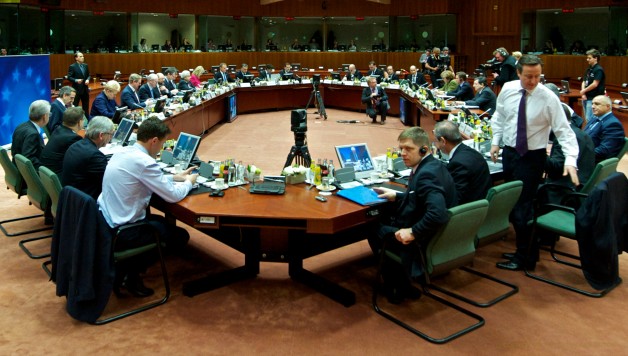
Last Friday, after 24 hours of negotiations, European leaders agreed on a new EU budget deal for 2014-2020. Two summits were needed: one was held in November 2012, and another last week that ended in agreement. For the coming seven years, the member states will contribute 960 billion Euros towards the EU project—85 billion less than the European Commission’s original proposal. It is a flimsy budget, one by no means fit to deal with the economic challenges that Europe is currently facing.
It is quite understandable that countries such as the Netherland, Denmark and the United Kingdom aimed for a slashed budget: in times of crisis, it is hard to sell the message of pouring even more money into Brussels’ accounts. Indeed, the slash-the-budget-camp has proved to be quite effective in furthering its agenda. The Danish Prime Minister Helle Throning-Schmidt got her €134-million rebate, the Netherlands will maintain its 1 billion euro discount through some changes in the arrangements through which it collects EU VAT for Brussels, and David Cameron can go home with the message that the current deal would amount to a budget cut of 34.4 billion Euros over the next seven years.
Still, even in these countries there should be little reason for celebration. They might between the three of them have saved a few hundred million to a billion Euros for their taxpayers; but this comes at the expense of the ability of the EU to tackle some of the important problems Europe has to deal with. Admittedly, extra money is reserved for the Structural and Cohesion funds, especially for Romania, Bulgaria and Croatia, which is expected to join the Union in July. However, under the current budget proposal nearly forty percent is still dedicated to the Common Agricultural Policy (CAP). A mere six billion Euros is earmarked for tackling unemployment among young Europeans in countries under the greatest economic strain, and around eighty billion is deemed enough to bolster research and innovation—an area in which Europe lags behind other parts of the world. In short, the budget proposal lacks any form of ambition.
The total sum that the 27 member states will transfer to Brussels represents a mere two percent of total state expenditure. Ninety-four percent of this money flows back into the member states’ economies through investments. This is why, as president of the European Parliament (EP) Martin Schulz argued in November 2012, the EU budget should primarily be seen as an investment budget. Obviously, not every country can count on the same level of investments. A number of countries, including the Netherlands, the UK and Denmark, are net contributors. However, we should not forget that this money is used to develop economies and new markets, and that, eventually, the opportunities for these states to export their products increase. Slashing the EU budget might thus seem attractive in the short term, but in the long run, it might prove counterproductive.
That is not to mention that member states increasingly call on the EU to deal with all sorts of issues. Since 2010 the European External Action Service (EEAS) has taken over a number of important tasks from the national foreign services (for more in this, see this recent PiS article). Moreover, ever since the start of the Euro crisis, a number of new regulatory agencies has been set up to strengthen supervision of the banking system in Europe. Consider for example the European Banking Authority (EBA), set up in 2010 to bolster European oversight over the banking sector: forty percent of its expenses are paid for through the EU budget. As multilateral cooperation increases, and consequently so do the tasks assigned to the EU to regulate such cooperation, they will have to be matched with appropriate resources. You cannot expect the EU to be able to do more without paying more, or even, with paying less.
The budget still requires approval by the EP. Even during the negotiations, a number of members of European Parliament (MEPs) objected to the proposal, saying they were not particularly happy with a marked down budget. They claimed the Parliament would veto the budget, and the EP remains negative on the final proposal that now been agreed by member state leaders. Ireland—which currently holds the rotating EU presidency—and Herman van Rompuy, president of the European Council, will have to make a big effort to get the support of MEPs. In the process, we could thus still see some changes in the figures that are now part of the deal. If that does not happen, and the EP vetoes the proposal, the EU will use the ‘roll-over method‘, where the previous budget is used (increased with an inflation of correction of two percent) in a month-by-month budgeting of the EU’s expenditures. This is a scenario in which there would be even less flexibility, and more importantly, fewer opportunities to tackle low economic growth and high unemployment rates in Europe.
Arguing that ‘Europe is too important to leave to the politicians‘, as Neelie Kroes, the European Commissioner for Digital Agenda did last week, goes too far. However, it should be clear by now that European leaders have failed to act in the interest of their citizens. Especially at this point, when virtually all European states are carrying out budget cuts, the EU could (and should) provide for an important mechanism to set up a coordinated policy to spur growth. A slashed budget is not the way forward; what we need is a budget that matches the scale of economic challenges that lie ahead. This means that we need a budget deal focused on growth, innovation, education and tackling unemployment. The current proposal fails on all these counts.
Niels Goet is an MPhil student in European Politics at Oxford University. He is the founder of the new blog EUspeak.eu, on which this post originally appeared. You can follow him on Twitter @NielsGoet.








No Comment